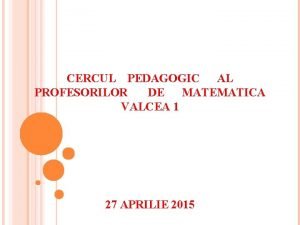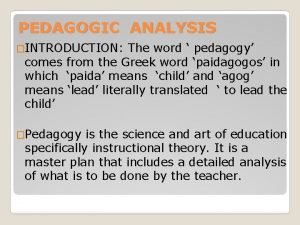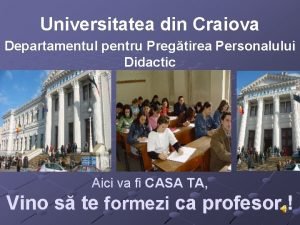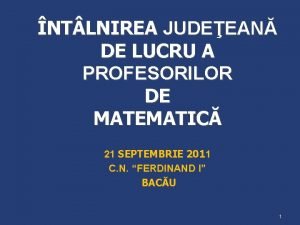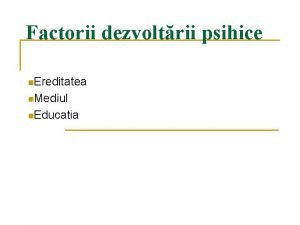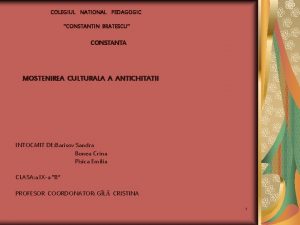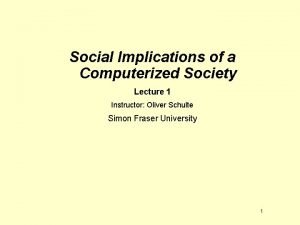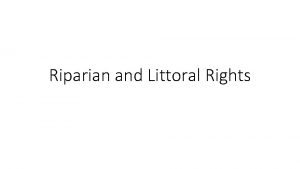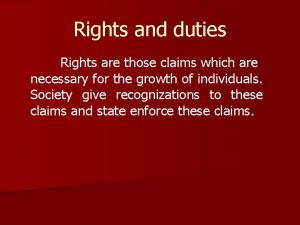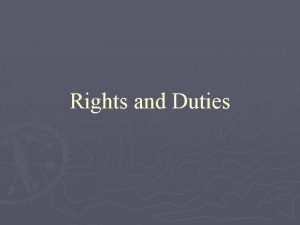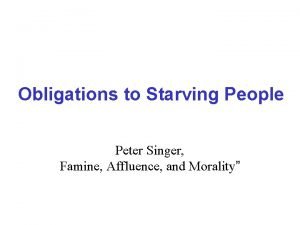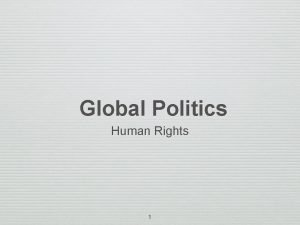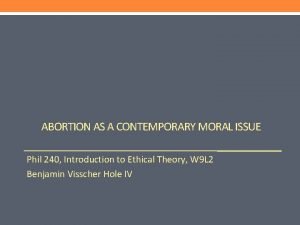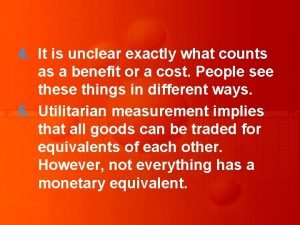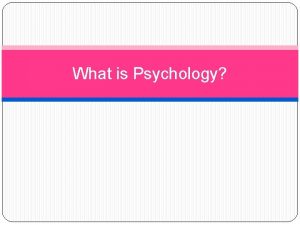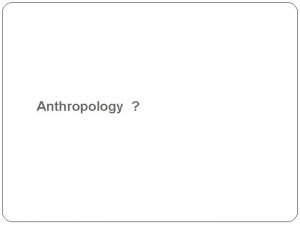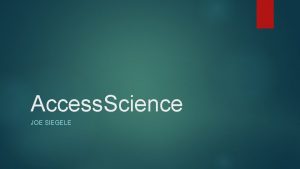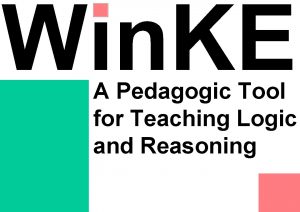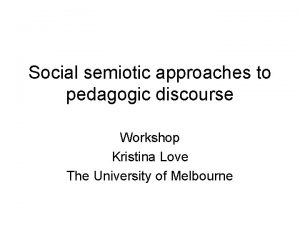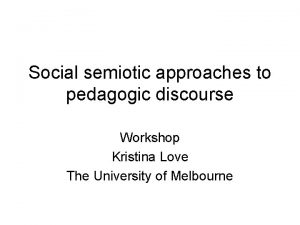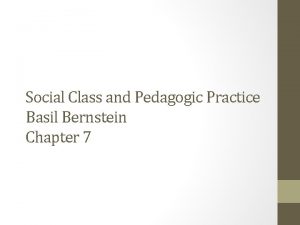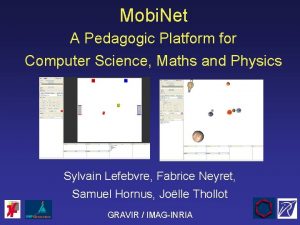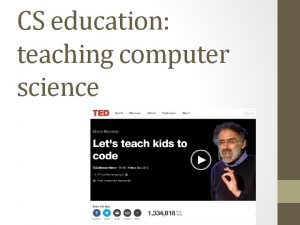Access to pedagogic rights in social science teaching
















- Slides: 16

Access to "pedagogic rights" in social science teaching and learning: findings from a study of English universities The ‘Pedagogic quality and inequality in university first degrees’ project: November 2008 - January 2012 (ESRC: RES-062 -23 -1438) Monica Mc. Lean, Andrea Abbas and Paul Ashwin Funded by: Presentation for the Centre for the Study of Higher Education, University of Kent, February 7 th, 2012

Pedagogic Quality and Inequality in University First Degrees: Origins: challenge to ‘quality’ and league tables Aim: to theorise ‘just’ teaching and learning Objectives: (1) to explore the value for students of social science degrees in different universities; (2) to investigate (in)equities in curriculum and pedagogy; and (3) to contribute to debates about pedagogic quality.

The Universities Social science degree courses in four universities: Prestige and Selective regularly rated in the top third of university league tables; Community and Diversity regularly rated in the bottom third.

Is undergraduate social science knowledge unequally distributed? Basil Bernstein’s theory 1. 2. 3. Knowledge creates relationships between inner and outer worlds. Education distributes knowledge unequally, according to society’s hierarchies. Knowledge is distribution by way of the classification of curriculum; and the framings of pedagogy= code.

Generating, analysing and interpreting data sets l C. 100 biographical and longitudinal student interviews; Interviews with seminar tutors and lecturers (16); 12( 3 x 4) videos of seminars; Survey of c. 750 students; Students’ work each year (+focus group); Analysis of curriculum, institutional and national data; Field notes; l Statistical data. l l l ‘languages of description’

Symposium questions l What is the value of undergraduate social science education for individuals and society? l How can the value of undergraduate social science be preserved and strengthened?

The formation of a specialised disciplinary identity Not everyone walks around and thinks ‘That’s an example of othering or stigmatisation’. (Leanne, Diversity, 3 rd year)

Distribution of transformative knowledge: the survey Scale Ranking of universities* Enhanced academic skills Selective, Diversity, Community, Prestige Enhanced employability skills Diversity, Community, Selective, Prestige Social Confidence Prestige, Community, Selective, Diversity A change in personal identity and an intention to change society for the better Selective, Diversity, Prestige, Community (*Institutions in Red have scores that are significantly higher than those in Blue)

The key to transformative knowledge: the survey Scale Ranking of universities Engagement with academic knowledge Selective, Diversity, Prestige, Community (*Institutions in Red have scores that are significantly higher than those in Blue)

Access to Pedagogic Rights Level Individual Social Political Right The right to: Capability Enhancement ‘the means of critical Confidence understanding and to new possibilities. ’ (2000, p. xx) Inclusion ‘be included socially, Communitas intellectually, culturally and personally. ’ (ibid) Participation ‘to participate in the Civic construction, maintenance discussion and transformation of action order’ (ibid. p. xxi)

Preserving and Strengthening Social Science Teaching and Learning – Who do students need to become if they are to access to pedagogic rights through social sciences? – What can be done to increase students chances of accessing pedagogic rights?

Specialised Pedagogic Identity l Disciplinary (‘retrospective pedagogic identity’) l PersonalSocial (‘prospective pedagogic identity’) l Performative (‘generic mode’)

Supporting the Development of a Specialised Pedagogic Identity Survey Data: • In all institutions rated teaching as good but not in rank order would expect Good Teaching Diversity, Community, Selective, Prestige

Good Teaching l l Coherent Course Design InterestRelevance Varied Teaching Methods Authentic and Varied Assessment l l l Lectures Lecturers’ Qualities Feedback for improvement Supportive and accessible tutors Inspire and control

Three Major Themes l Relationships between tutors and students l High Quality Discussion l Challenging Students (Encouraging Hard Work)

Conclusions 1. 2. 3. 4. 5. Social science knowledge has the potential to personally transform students. It can provide access to pedagogic rights, which is important to democratic, civic and social life. The outcomes of university education conceptualised as pedagogic rights. Hard work on both the part of tutor and students is needed to develop specialised pedagogic identities. Intellectualising teaching- it needs thought and debate in the disciplines.
 Cerc pedagogic valcea
Cerc pedagogic valcea Pedagogical analysis
Pedagogical analysis Dppd timisoara contact
Dppd timisoara contact Proces verbal cerc pedagogic
Proces verbal cerc pedagogic Epigenetismul piagetian
Epigenetismul piagetian Vestigile
Vestigile Positive rights and negative rights
Positive rights and negative rights Define littoral rights
Define littoral rights Duty towards self
Duty towards self Legal rights vs moral rights
Legal rights vs moral rights Negative right
Negative right Positive vs negative rights
Positive vs negative rights Rosalind hursthouse
Rosalind hursthouse Positive rights and negative rights
Positive rights and negative rights What are your favorite subjects
What are your favorite subjects Social science vs natural science
Social science vs natural science Natural science and social science similarities
Natural science and social science similarities
